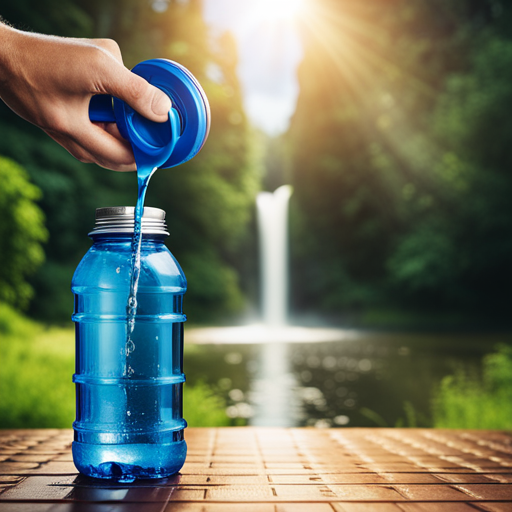Are you experiencing rapid water flow through your Brita filter? While it may seem like a positive attribute, this can actually be a sign of underlying issues that can reduce the overall effectiveness of the filter.
But don’t worry, we’ve got you covered with some Brita filter secrets to troubleshoot rapid flow and ensure that your tap water is properly filtered.
In this article, we will explore the causes of rapid flow, how to identify any issues with your filter, and provide solutions for effective filtration. Whether you’re a long-time user of Brita filters or new to the game, understanding the secrets of proper filtration can make a big difference in the quality of your drinking water.
So, let’s dive in and get to the bottom of those pesky rapid flow issues.
Key Takeaways
– Rapid water flow from a Brita filter can indicate issues such as improper connection, cracks in filter housing, or use of third-party filters.
– Filtering too fast can result in less effective treatment and leave harmful pollutants, as well as poor taste or quality filter water.
– Proper installation and checking for damage are quick fixes for filtering too fast, while defective or expired filters should be identified and replaced.
– Brita filters offer a cost-effective, eco-friendly, and convenient solution for accessing clean drinking water, with a strong filtration system that removes the clear majority of water pollutants.
Causes of Rapid Flow
If your Brita filter is filtering too fast, you might be experiencing issues with improper connection, cracks in the filter housing, or using third-party filters.
One common reason for rapid flow is poor filter maintenance. Over time, filters can become clogged with contaminants, reducing their effectiveness and causing water to flow more quickly. To avoid this, make sure to replace your filter regularly, according to the manufacturer’s instructions, and clean your filter housing periodically.
Another possible cause of rapid flow is the use of third-party filters. While these filters may be cheaper than Brita brand filters, they may not meet the same high standards for quality and effectiveness. In some cases, third-party filters may even cause damage to your filter housing or reduce the lifespan of your Brita filter.
To ensure that your filter is working properly, always use Brita brand replacement filters and follow the manufacturer’s instructions for installation and maintenance.
Identifying Issues
To identify issues with your water filtration, start by checking for proper installation and any signs of damage or defects.
If your filter is filtering too fast, it’s important to first make sure it’s properly attached to your faucet. If it’s attached correctly, inspect the filter housing for any cracks or damage that could be causing rapid flow.
If the filter housing appears to be in good condition, try running water through the filter and checking for any defects.
Filter maintenance is key to ensuring your Brita filter is working effectively. Avoid using third-party filters, as they may not meet the high standards of Brita filters and could cause rapid flow or poor water quality.
It’s also important to replace your filter regularly, as expired filters can allow bacteria to grow and cause odd water color, unpleasant taste, and off-putting smell. Check the lifespan of your filter using the indicator light and replace it with a Brita brand replacement filter when necessary.
By properly maintaining your Brita filter and avoiding the use of third-party filters, you can ensure effective water filtration and access to clean drinking water.
Solutions for Effective Filtration
Ensure the proper functioning of your water filtration system by regularly checking for damage and defects and using only high-quality replacement filters.
Maintenance tips for your Brita filter include inspecting the filter housing for cracks or other issues, ensuring proper installation and connection of the filter, and replacing the filter on a regular basis.
It’s important to note that using third-party filters may not meet the high standards set by Brita, and can result in rapid flow and decreased effectiveness of the filter.
By using Brita brand replacement filters, you can enjoy the benefits of clean, great-tasting water in a cost-effective and eco-friendly way.
Not only does using a Brita filter reduce plastic waste from bottled water, but it also removes the clear majority of water pollutants from tap water.
With proper maintenance and regular replacement of your Brita filter, you can ensure that your water filtration system is working effectively and providing you with the clean, refreshing water you need for a healthy lifestyle.
Conclusion
Now that you have a better understanding of the causes of rapid flow in your Brita filter, it’s important to take action to ensure effective filtration.
First, check the connections and housing of the filter to ensure there aren’t any cracks or improper connections. If everything looks good, make sure you’re using Brita brand filters, as third-party filters may not be as effective.
If you’re still experiencing rapid flow, consider replacing your filter entirely. It’s better to err on the side of caution and have a properly functioning filter to ensure the removal of harmful pollutants from your tap water.
With these troubleshooting tips and a little bit of effort, you can continue to enjoy clean and safe drinking water with your Brita filter.
